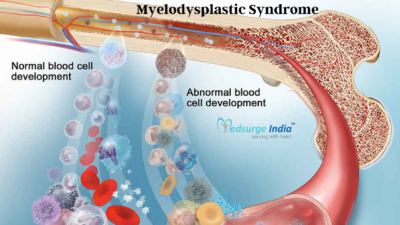
Myelodysplastic Syndrome Treatment in India is done at an affordable cost by the best doctors and at top-class centres. Through this blog we will also be sharing complete details related to MDS- Its Causes, Symptoms, Diagnosis & Treatment Options
Understanding Myelodysplastic Syndrome (MDS) and Its Causes
Myelodysplastic Syndrome (MDS) is rare before the age of 50. The risk of MDS increases as a person ages.
Myelodysplastic Syndrome is a progressive group of disorders characterized by abnormal blood-forming cells in the bone marrow, spongy tissue in the center of bones.
- The exact cause of the development of MDS in people without inherited syndromes is still unknown.
- Researchers estimated that exposure to toxic chemicals such as benzene or chemotherapy/anti-cancer drugs can damage the DNA inside bone marrow cells that lead to MDS.
- Sometimes, the changes in genes inside a cell probably due to random events without any role of an outside cause can lead to the development of MDS.
- These changes in genes could be a lifetime process explaining the reason why MDS occurs in older people.
What are the symptoms associated with Myelodysplastic Syndrome?
In some cases, an individual with MDS does not show any signs or symptoms at first. However, if you experience any of the following symptoms:
- Frequent infections due to low white blood cell count (leukopenia)
- Bleeding due to low platelet count (thrombocytopenia)
- Pinpoint-sized red dots under the skin caused by bleeding (petechiae)
- Paleness due to low red blood cell count (anemia)
- Breathlessness
- Fatigue
MyeloDysplastic Syndrome: Classification and Staging
There are two classification systems that define the subtypes of MDS – the World Health Organization (WHO) classification system or the French-American-British (FAB) system. However, the WHO classification system is preferred which defines the subtypes as per the type of blood cells – red cells, white cells, and platelets – are involved.
Some of the major characteristics of the subtypes of MDS are:
- MyeloDysplastic Syndromes with Single-lineage Dysplasia: In this subtype, either of the blood cell types has a low count and appears abnormal when viewed under the microscope.
- Myelodysplastic Syndromes with Multilineage Dysplasia: It is characterized by one to three cytopenias (low count of specific types of blood cells) in the blood and two to three dysplastic lineages in the bone marrow.
- MDS with Ring Sideroblasts: This subtype has a low number of one or more blood cell types. Also, there are rings of excess iron in the existing red blood cells in the bone marrow.
- MDS with isolated del(5q): This subtype involves a low count of red blood cells along with the cells having a specific mutation in their DNA.
- MDS with Excess Blasts: This subtype has a low count of any of the three blood cell types that appear abnormal when examined under a microscope. In stage 1, 5 to 9 percent blasts occur in the bone marrow and 2 to 4 percent blasts occur in the blood. Stage 2 involves the occurrence of 10 to 19 percent of blasts in the bone marrow and 5-19 blasts in the blood.
In addition to the above-mentioned classification system, your doctor can also sense the prognosis with the Revised International Prognostic Scoring System (IPSS-R) system. The system involves three factors:
- Complete blood count results
- The proportion of immature blood cells in the bone marrow
- The pattern of chromosomal abnormalities
Your doctor uses this system to know the extent of the disease, to choose the best treatment when to begin the treatment, your prognosis, and the risk of developing acute leukemia later.
Your doctor confirms your IPSS-R score after evaluating your blood tests and bone marrow test results.
Risk Factors of Myelodysplastic Syndromes
Certain factors are responsible for increasing your risk of developing MDS. These factors include:
- Age: You are likely to have MDS as you age. It mostly hits people who are above 60 years of age.
- Treatment with Chemotherapy or Radiation to treat cancer: When a person is previously treated with chemotherapy or radiation, he/she becomes prone to developing MDS.
- Exposure to toxic chemicals: Exposure to chemicals such as benzene increases the risk of occurrence of MDS.
Infections Complications in MDS Patients
Diagnosing with MDS increases the risk of other possible complications and they are:
- Chances of cancer: Some people with MDS are likely to develop either bone marrow cancer or leukemia.
- Recurrent infections: A person with MDS has a low count of blood cell types which increases the risk of recurrence of serious infections.
- Unusual Bleeding: Lesser count of platelets in your blood increases the chances of unstoppable bleeding.
- Anemia: Low count of red blood cells causes anemia which makes you tired or fatigued.
Diagnosis of Myelodysplastic Syndrome
If your doctor suspects that you might have MDS, your doctor will suggest a thorough physical exam, tests, diagnostic procedures, and may ask you about medical history. The following tests include:
- Blood tests: A complete blood count test (CBC) will help to determine the count of white blood cells, red blood cells, and platelets. Your doctor will examine if there is any change in the shape, size, and appearance of blood cells in your blood.
- Bone marrow for testing: Your doctor may perform a bone marrow biopsy and aspiration by inserting a tiny needle into the back of your hip bone and extract a small amount of liquid bone marrow.
Your hematologist then sends these blood and bone marrow samples to the laboratory for further analysis. These tests help in MDS diagnosis, type of syndrome, prognosis along treatment options.
What are the treatment options for Myelodysplastic Syndrome?
There is no particular cure for MDS, however, there are treatment options that can slow down its progression, prevent complications, and ease symptoms. Clinical trials and research are still ongoing on MDS treatment.
However, after diagnosing, your doctor may suggest the following treatment options:
-Blood Transfusions: Blood transfusions involve the infusion of healthy blood cells into patients with MDS to replace the damaged blood cells. It helps ease and control symptoms.
– Medications: There are medications to treat patients with MDS which are prescribed by your doctor as per the severity of the disease. Medications to treat MDS are:
– Increase the growth of blood cell types: These medications are growth factors that are artificial versions of substances in the bone marrow. This medication stimulates the bone marrow to produce more red blood cells reducing the need for blood transfusions. It also promotes white blood cells making your body less prone to infections.
– Suppress the immune system: Medications to control the immune system which reduces the need for red blood cell transfusions.
– To treat certain genetic abnormalities: In the case of patients with a gene mutation called isolated del(5q), your doctor may prescribe lenalidomide (Revlimid).
– Stimulates the maturation of red blood cells: Medications to stimulate the restoration and maturation of red blood cells that lessen the need for repetitive blood transfusions.
Stem Cell Transplant for Myelodysplastic Syndrome

Stem cell transplant, also known as bone marrow transplant, is the only potential treatment to cure MDS. As stem cell transplant is major surgery and comes with a bunch of serious complications, doctors recommend it to patients who are healthy to go through it.
Stem cell transplant involves highly energized radiation chemotherapy drugs to remove the damaged blood cells from the bone marrow followed by an allogeneic transplant – a surgical procedure to replace defective blood cells with healthy ones.
For older adults, the radiologist prefers chemotherapy drugs with less intensity that may minimize the need for bone marrow transplants.
Life After MDS Treatment
After undergoing cancer treatments, you still may need help in every way – socially, physically, economically, and as long as it can be.Even after treatment, you may have chances of recurrence. Therefore, follow-up visits are a must. Also, there are other factors that you should consider and they are:
- Lifestyle factors: You need to follow a healthy lifestyle including food and nutrition. Consult a skilled dietitian who can prepare a proper diet plan for you.
- Supportive Care and Pain Management: There are various side-effects of therapy including pain, nausea, fatigue. In this phase, make sure you have support from your family or loved ones who can help you with your emotional and spiritual needs.
- Rehabilitation and Exercise: Exercising is important even after undergoing surgery. It is advisable to join therapeutic exercises and training programs for quicker healing.
Doctors and Departments that Treat Myelodysplastic Syndrome
MDS is a life-threatening health condition if diagnosed at an advanced stage. The condition needs treatment by highly skilled medical specialists to improve quality of life and quicker recovery. Different departments are:
- Hematologic Oncology
- Stem cell transplantation
- Radiation Oncology
- Radiology
- Pain Management
- Rehabilitation
- Pathology
What is the cost of Myelodysplastic Syndrome Treatment in India?
- The Myelodysplastic Treatment mainly includes stem cell transplant which costs around USD 17,500.
- Therefore, the cost of Myelodysplastic Treatment in India ranges from 17,000-19,000 USD.
- However, the cost may vary depending on various factors such as type of hospital, room, treatment opted, evaluation tests, follow-up visits.
- Furthermore, if you’re traveling from another city or country, the cost also includes accommodation, food, transportation, and traveling.
Also Know: Myelodysplastic Syndrome Treatment Cost In India
Why Myelodysplastic Syndrome Treatment in India?
There are many reasons people across the globe travel to India for medical treatment, but the main reason is high-quality cost-effective medical treatment. Also, there is no language barrier as India has a number of hospitals with fluent English-speaking medical professionals who communicate with foreign patients quite well.
There are a number of health assistance partners and Medsurge India, being one of them, ensures quick, hassle-free treatment at top hospitals in India at zero cost assistance.



 (1).png)